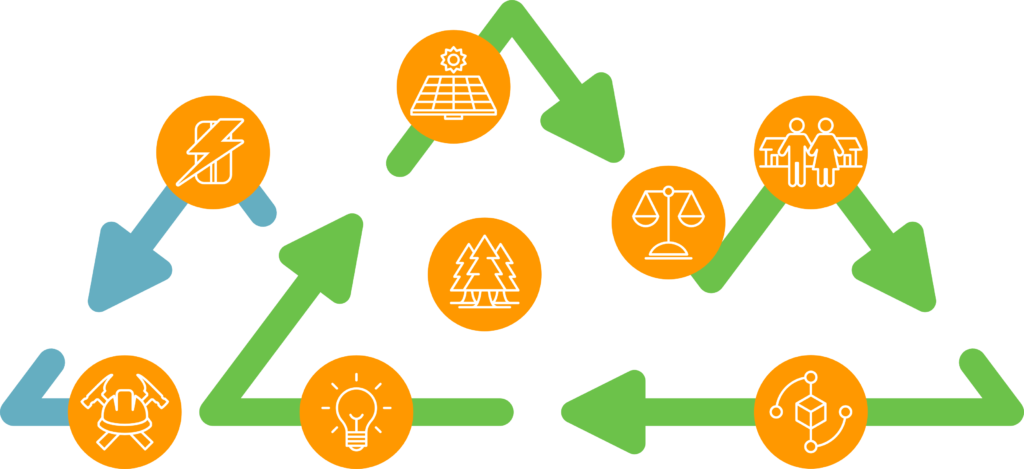There are eight key ACT Now projects, 4 construction and 4 non-construction, that will play a key role in strengthening the region.




ACT Now’s direct region of interest is composed of 21 economically distressed counties in Southern West Virginia, including: Boone, Cabell, Clay, Fayette, Greenbrier, Kanawha, Lincoln, Logan, Mason, McDowell, Mercer, Mingo, Monroe, Nicholas, Pocahontas, Putnam, Raleigh, Summers, Wayne, Webster, Wyoming. The eight key ACT Now projects include:
GROW Now is the workforce development component of the ACT Now Coalition led by Generation West Virginia alongside Coalfield Development, the Alliance for the Economic Development of Southern WV, High Rocks, and West Virginia University. GROW Now is improving job training and placement strategies in West Virginia.
The program focuses on regional barriers to employment by offering subsidized job training and directly employing on-the-job trainees. GROW Now partners plan to train 2,090 jobseekers, place 2,223 jobseekers in quality cluster jobs, and retain 2,295 workers in advanced tech careers with employee/employer support services. The goal is to support regional workforce growth, profitability, and job creation while addressing barriers to employment.
The Community + Business Resilience Initiative (CBRI) supports the growth of a West Virginia advanced technology cluster by working with communities and local businesses to provide multi-layered community-based programs, small business support, and technical assistance to help create business strategies and practices, as well as economic resilience plans. The initiative builds a 3-prong approach that serves as the foundation for successful economic diversification:
The WV Community Development Hub (The Hub), Advantage Valley, WV Hive, West Virginia Brownfields Assistance Centers, and AFV Educate have partnered to create conditions for the workforce, business, and industry growth in the 21-county ACT Now region through community coaching and planning, site development, and business development services. This partnership brings a suite of dedicated services – economic resilience planning + community coaching, locally-prioritized site assessment, and entrepreneurial business practices support for local business development- directly to 16 communities in the ACT Now region through multi-year support as part of the Accelerate WV program. Additionally, entrepreneurial and business practices support will be provided to GROW Now training participants, and to aspiring entrepreneurs, entrepreneurs, and business owners participating in or partnering with one of the additional 7 ACT Now Coalition projects.
The Black Diamond Factory in Wayne County, WV will soon be the site for major job creation and employment in emerging industries. This five-acre property will include businesses working in the solar industry, as well as materials reuse and recycling – growing good jobs for people in the local community and surrounding region. A number of the existing buildings will be preserved and renovated for new use and these spaces will continue the tradition of creating and making that have occurred over the last one hundred years on-site. Solar Holler, a full service solar developer and installer, will utilize new spaces on-site to host growing operations. The ReUse Corridor, a network of community organizations and businesses across the region, will utilize spaces for the storage and distribution of salvaged and upcycled material. Over the next decade, we expect the activity to create hundreds of jobs.
The City of Charleston, the State of West Virginia, Kanawha County, the WV International Yeager Airport, Charleston Area Alliance, and regional economic development organization Advantage Valley will transform the 9.7-acre, 110,000 sq. ft. idled Kanawha Manufacturing plant in a low-income neighborhood in the heart of the city. Kanawha Manufacturing Co. began building equipment for the West Virginia coal mines in 1902, and expanded in the power generation aftermarket in the 1960s. It has reached its last generation of owners who now seek a transition strategy. ACT Now will transform this site into the new LIFT Center, which will include a Coalfield jobs learning and training center, along with the Charleston Food Manufacturing Hub and other advanced technology uses. This will include a new Marshall University Battery Research Institute that will foster the emerging aerospace sector, along with new charging stations and pilot training at Yeager Airport and other West Virginia airports.
The Huntington Business Innovation Zone (H-BIZ) Manufacturing HUB project will repurpose a brownfield factory site and an existing machine shop building to become a welding and robotic training center as part of Marshall University’s Advanced Manufacturing and Technology Center. Rejuvenating the former brownfield manufacturing facility will create economic opportunity for the region. The project consists of the rehabilitation of the former 10,800 sq. ft. machine shop and construction of a new 2,000 sq. ft. addition. Project elements include the rehabilitation of the building systems, parking, stormwater infrastructure and roadways.
This investment will create new jobs, new training opportunities and bring new advanced energy into a large swath of underutilized land creating a sense of community between an established Highlawn neighborhood and Marshall University.
This project features a substantial rehabilitation of the old Robertson Building in Logan, WV, also known as the old Miners Academy. This will include building system updates, accessibility improvements, and equipment installation that will transform this once empty building into the nexus of the emerging technology sector in the region. Due to its location at the center of all ACT Now Coalition activities, it is perfectly situated to provide a home to several economic-based ACT Now project components and host several coalition partners. Ultimately, this project will create more than 400 new jobs while addressing economically distressed communities within the region.
© 2023 ACT Now Coalition. All Rights Reserved. | Privacy Policy | Proudly Developed by JJN Multimedia